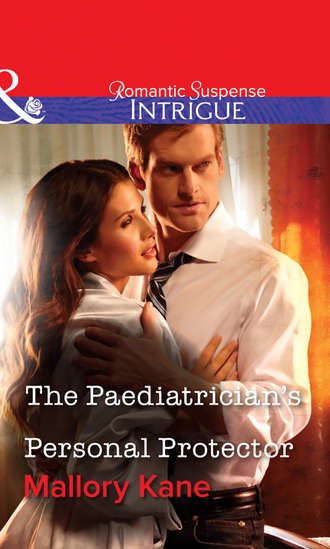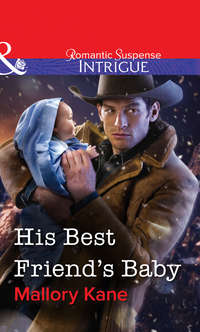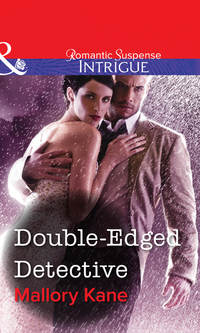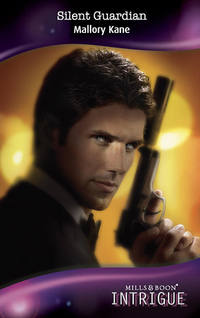
Полная версия
The Paediatrician's Personal Protector

The Paediatrician’s Personal Protector
Mallory Kane

www.millsandboon.co.uk
Table of Contents
Cover
Title Page
Dedication
Chapter One
Chapter Two
Chapter Three
Chapter Four
Chapter Five
Chapter Six
Chapter Seven
Chapter Eight
Chapter Nine
Chapter Ten
Chapter Eleven
Chapter Twelve
Chapter Thirteen
Chapter Fourteen
Chapter Fifteen
Copyright
To Daddy, my hero and my biggest fan. I know you and Mama are dancing.
Chapter One
Reilly Delancey was late. He hurried up the steps of the St. Tammany Parish courthouse, through the metal detectors and into the large central hall, fingering the knot of his tie and wishing he hadn’t tied it so tightly.
He spoke to a couple of fellow officers who were waiting to testify in other cases. They had the same resigned expression on their faces that he was sure was on his.
A quick glance at the courtroom schedule told him that the McGilicutty case, in which he was testifying as the lead hostage negotiator, was in Courtroom Three. He rushed to the door, only to be stopped by the assistant district attorney who’d prepped him.
“Judge Simmons just got here,” Hale Dunham told him. “It’ll be at least twenty minutes before we need you.”
“Simmons is hearing the case? It’ll be thirty. I’ll get a cup of coffee.”
“Be back in fifteen,” Hale warned.
“Eighteen,” he countered and headed toward the small kiosk on the far side of the hall. If Simmons had just entered the courtroom, it would be ten minutes before he finished straightening his robes and arranging his gavel and pens. Then another twenty before the preliminaries were over. Simmons questioned everything.
He ordered and paid for his coffee and dumped sugar into it, then stood sipping it as he glanced around at the hubbub in the courthouse.
Two detectives walked by. Dagewood and Phillips. He didn’t remember their first names. They worked with his twin brother, Detective Ryker Delancey. Phillips was loud and overweight, but basically he seemed like a good guy. Dagewood, on the other hand, was arrogant and rude.
As if to prove Reilly’s opinion, Dagewood stopped in front of him. “Well,” he said. “If it’s not the Delancey that didn’t make detective.”
Reilly bit his tongue. Somehow, Dagewood had figured out how badly Reilly had coveted the position Ryker had gotten, and he mentioned it every chance he got.
“Dagewood,” Reilly responded noncommittally, taking his own shot. The big detective liked the uniformed officers to address him by his title, so Reilly never did.
“So what’s up today?” Dagewood continued. “Defending a traffic ticket?”
Phillips chuckled at the old joke.
Reilly sipped his coffee and didn’t answer.
“Come on, Ted,” Phillips said. “I didn’t get any breakfast. By the time we get back to the office, all the doughnuts’ll be gone.”
“Hang on,” Dagewood said. “I haven’t tried the coffee here. If it’s good enough for Delancey …”
Phillips laughed again and the two stood in line.
Reilly ignored them as his gaze slid over the crowd. He half expected to see Ryker. His brother was here for the sentencing hearing of the man who’d killed four women in St. Tammany Parish over the past five years.
Reilly and Ryker didn’t normally see each other a lot these days. They ran in different circles since Ryker was a detective and Reilly was SWAT. But Reilly had babysat his brother’s injured star witness a few weeks ago while Ryker was booking the killer. She wasn’t just his star witness either. Since two weeks ago, she was his fiancée.
Ryker engaged. Reilly shook his head. Hard to believe. Before his older brother—older by seven minutes—had met Nicole Beckham, he’d never even dated anyone seriously.
As his thoughts wandered and his coffee cooled, his gaze settled on what just might be the most striking woman he’d ever seen. She was tall and slender, with midnight-black hair that fell to her shoulders and a confident walk that had more eyes than his following her.
As soon as he realized that most of the males in the central hall were watching her, it became obvious that she wasn’t paying attention to any of them. She was headed straight for him.
Or more likely, for the coffee kiosk.
Whatever she had her eyes on, Reilly would bet a month’s pay that she’d get it. She was the confident, super-cool type who got whatever she wanted. He swallowed a chuckle as he watched her mow down the men in her path with a glare. Her high heels clicked with purpose on the marble floor.
He couldn’t tell where she was looking behind the narrow, black-rimmed glasses she wore, but he managed to resist the urge to glance behind him. He kept his gaze on her face. He was dying to know if her eyes were as black as her hair and her glasses frames. He got his answer when she stopped directly in front of him.
They weren’t black. They were green. And flashing with irritation. At him.
At him?
“Detective Delancey,” she said, propping a hand on her hip.
Reilly shook his head and muttered his automatic response. “No, I’m not—”
“Don’t start with me again, Detective. You must be so proud. My father is barely recovered from the heart attack he suffered in your jail less than two weeks ago. But he was determined to stand before the judge and plead guilty. How could you be so quick to catch him, but no one can find my sister’s killer? Why don’t you spend some time on that!” She paused to take a breath.
Reilly jumped at the opportunity. “I’m not Detective Delancey,” he said quickly. “People make that mistake all the time. I’m—”
She jerked off her glasses and took aim with those lasersharp eyes. “What do you mean you’re not—” She stopped, frowning at him.
Reilly assessed her more closely as, behind him, Phillips chuckled. Then Dagewood spoke up loudly. “Need any help there, Officer Delancey?”
Without the glasses shielding her eyes, he could see something behind their cool expression. Something that was far from cool and far from confident. The lids were rimmed with red and faintly puffy. Her generous mouth was pressed into a severe line, and the skin along her jawline appeared stretched tight. He could see pale blue veins under the delicate skin of her neck. The black-haired beauty was wound tight as a spring about to break.
He replayed her words in his mind, fitting the pieces together.
Detective Delancey—
My father … pleaded guilty—
She was the daughter of Ryker’s serial killer. That surprised him. He wracked his brain, but couldn’t come up with the man’s name.
“No. You’re not Detective Delancey,” she said, shaking her head.
He shrugged, intrigued that she’d arrived at that conclusion so quickly. Usually it was the other way around. He’d had people actually argue with him about which twin he was, and so had Ryker. Which was funny, because he didn’t think he and his brother were alike at all. Both of them had always been lean, but Ryker had put on a little weight in the past year. And Reilly was a lot less OCD about haircuts and clothes and life in general.
“Sorry,” he said to the woman. “It happens a lot. Especially if I’m dressed up.” He ran his finger under his collar again. “Which is as seldom as possible. I hate suits.”
The tension around her mouth softened a bit.
“I’m Officer Reilly Delancey. SWAT.” He held out his hand.
From behind him he heard, “The Delancey that didn’t make detective,” followed by Phillips’s annoying laugh. One day he was going to punch Dagewood.
She ignored or didn’t notice his hand as she sent a swift, withering glance toward the two detectives. “Where is Detective Delancey?” she asked, looking at her watch. “He disappeared as soon as the judge dismissed us. I thought maybe he’d be out here.”
“My guess is, if he’s not scheduled for another court appearance, he’s gone to check on his fiancée,” Reilly replied.
The woman in front of him stiffened even more.
“To check on his fiancée? Of course. That’s exactly what I’d do after I put a sick old man in prison. Or maybe I’d go to Disney World.”
Reilly’s hackles rose at her sarcasm, although he could hardly blame her for being upset. After all, she’d just witnessed her father plead guilty to what—four counts of murder? Still, he leaped to his brother’s defense, choosing his next words carefully.
“My brother’s fiancée was injured on the day your father was arrested,” he said carefully. “She had a doctor’s appointment this morning.”
Her sharp glance and the grimace of pain that passed fleetingly across her face told him she understood what he hadn’t said. Ryker’s fiancée’s injury had been at her father’s hand.
“I’m sorry about your father—and your sister,” he offered.
Her mouth tightened. “Why?” she asked. “You don’t know me. Or my family.”
“I know a little about your father’s case. How the death of your sister—”
“How can I find Detective Delancey?” she interrupted, two bright spots of color appearing in her pale cheeks.
Despite her words, what he heard was that’s none of your business. And it wasn’t. He’d crossed a line. He immediately backtracked.
“He’s probably already left the courthouse. If you want, I can make sure he gets in touch with you.”
She glanced at her watch, then back at Reilly. Suddenly she appeared unsure, and that surprised him. She didn’t seem like the type to ever be unsure of anything. She might be wrong, as she was in thinking he was Ryker, but she would always be sure.
“Hand me your phone,” he said.
She put her glasses back on and gave him a narrow look. For a moment he wasn’t sure she was going to comply. But finally her hand snaked inside her purse and she handed him a smart phone. He quickly programmed his number and name into it, then pressed Call. His cell phone began to ring. He dug it out of his pocket, answered it, then hung up her phone and handed it back to her.
“What’s your name?” he asked without looking up.
“Dr. Moser,” she said without hesitation.
He raised his gaze to hers.
“Christy—Moser.” She stared for an instant at the display on her smart phone, then stuck it into the pocket of her jacket.
Reilly finished entering her name into his phone. “Okay. I’ll get my brother to call you.”
“How soon? I need to find out what happens next. How long my father has before he—” She stopped and cleared her throat. “I have to go,” she said. She fingered the watch on her left wrist and looked at it for the third time. Or was it the fourth?
“Yeah, me too,” he said, checking the time on his phone’s display before he pocketed it. His seventeen minutes were up. He had to get to Courtroom Three.
Christy Moser turned and walked away. Reilly watched her excellent backside sway in the black fitted skirt. It was amazing how high-heeled shoes affected a woman’s walk. In a good way.
Dr. Moser. He’d have to ask Ryker what kind of doctor the serial killer’s daughter was.
CHRISTMAS LEIGH MOSER stood at the front door of the house where she and her sister Autumn had grown up in Covington, Louisiana. Yellow crime-scene tape crisscrossed the doorframe, garish against the dingy white paint.
She stared at it, aghast. Why was her dad’s house a crime scene? Nothing Detective Delancey had told her had indicated that her father had done anything here. Horror churned in her stomach, mingled with shame.
She hadn’t been in the house since her sister’s death. She should have made more of an effort to get back here to see her dad. But two years of residency plus a fellowship in pediatrics at one of the foremost children’s hospitals in the northeast made it difficult to get home to sleep, much less take a trip thirteen hundred miles away.
She’d called him every week—well, nearly every week. How had she not known something was dreadfully wrong with him? How had she not realized he’d gone off the deep end?
A twinge under her breastbone gave her the answer to that. She had known something was wrong. Known it and ignored it. She’d chalked up his monotone answers and disinterest to mild situational depression, and had encouraged him to get out more, see his friends, get back to playing golf. She’d told him he should talk to someone and suggested that he ask the pastor of his church about a grief-counseling class or a therapist.
She thought about the one time she had visited her dad in the past five years. She’d attended a seminar in New Orleans. She’d met her dad at a restaurant for a hurried dinner before kissing him on the cheek and rushing back to her hotel room to prepare for a talk she was giving the next day.
Now here she was. Too late. Her family home had become the home of a killer.
She shuddered, swallowing hard. Shock and revulsion and fear had dogged her steps ever since she’d received the phone call telling her that her father had been arrested. The call had come less than twelve hours after she’d talked to her dad. When she put the times together, she realized that within an hour of their conversation, he’d shot two people, a policeman and a restaurant owner, and had tried to kill a third.
He’d done it with the misguided notion that he could force the police to reopen Autumn’s case.
Guilt washed over Christy like a blast of hot summer wind, stealing her breath and leaving her back and neck prickling with sudden sweat. The certainty that this was her fault sat like a dead weight on her chest. She’d gone off and left him to deal with Autumn, knowing her younger sister was in trouble with drugs.
If she’d stayed in Louisiana, would her little sister still be alive? Would her father be an active, vibrant man in his early sixties, rather than a deranged murderer?
Rationally, she recognized that her decision probably wouldn’t have changed what happened, but rationality and guilt were like matter and antimatter. They couldn’t occupy the same space. And the guilt was stronger.
Christy realized she’d become exactly what she’d sworn she’d never be, a workaholic career woman with no time for family, like her mother. Deborah Moser had been a tenured professor at Loyola until the day she’d been in the wrong place at the wrong time.
Christy glanced around the neighborhood where she and Autumn had played as children. None of the neighbors were outside, and there were no cars on the street. She’d once known many of the people who lived here. Where were they now? Resentment burned deep within her. Why hadn’t they known something was wrong with her dad?
Why hadn’t she?
She looked down at the key in her hand. Suddenly, she needed to go inside and look at her father’s things. See her sister’s room. Wallow in some more guilt.
She slipped the key into the lock and turned it. The door opened easily, silently.
Christy ducked under the crime-scene tape. She pushed the door wide. The first thing that struck her was how dark the inside of the house was. The second, that it had been that way ever since their mother had been killed when Christy was sixteen and Autumn was twelve.
Leaving the front door open for light, she stepped over to her father’s recliner and turned on the lamp on the side table. The glow was feeble. After a couple of seconds, her eyes adapted to the dark and she could see a little bit.
Smudged gray dust outlined a large square on the side table.
She wiped a fingertip across it. Fingerprint dust. It had to be. The peculiar color distinguished it from household dust.
Looking at the table, Christy knew immediately what had lain there. Dad’s scrapbook. More pain gnawed at her heart. Ever since she could remember, he’d kept it. How many times had she sat in his lap as he’d pasted pictures of her and baby Autumn in the leather-bound book and carefully, in neat, precise printing, labeled each one with their name, the date and a sweet or funny comment?
But that image quickly morphed into the memory of Detective Ryker Delancey showing her the pages in the back of that beloved book, behind the family pictures. Pages containing baby photos of girls she didn’t know, with comments written beside them in a shaky hand she hardly recognized as her father’s.
Those were her father’s victims, and Detective Ryker Delancey had made her look at them, made her read her father’s careful notes about where they lived, when their birthdays were and when he planned to kill them. Then the detective had demanded to know if she’d seen them before.
Of course she’d never seen them. Angrily she swiped her hand across the table’s surface, obliterating the dust outline of the book. Did the detective know he’d destroyed every last good memory from her childhood? Did he care?
She dusted her hands together. She should leave. She knew she wasn’t supposed to cross crime-scene tape. But this was her home, or it had been. Didn’t she have a right?
She glanced desperately around the dimly lit room, hoping to find something—anything—that would give her an explanation for why her father had done what he had. Something rational that she could take to the police and say, “Here, look. This is what he was doing. Now it makes sense, doesn’t it?”
But she knew there was nothing to find. No rational explanation, no sane reason.
She blinked and realized her gaze had settled on a framed picture Autumn had drawn of their mother. It hung on the wall above the television. Christy’s eyes filled with tears. Their mother had been beautiful and smart. Autumn had looked just like her. She stepped over and touched the glass. More dust. She sneezed.
Guilt and embarrassment tightened her chest, making it difficult to breathe. Anyone coming into this sad house would immediately see how badly she’d neglected her father.
She reached into her purse for a tissue.
“Freeze!” a harsh voice barked.
Shocked, she turned. The unmistakable silhouette of a uniformed police officer darkened the doorway.
“Wait!” she called out, her hand still inside her purse. “I’m—”
“I said freeze!”
She froze.
The harsh beam of a flashlight swept her, blinding her as it passed over her face. Finally, the beam stopped on her hands.
“Hold it!” he barked when she started to pull her hand out of her purse. “Don’t move that hand.”
“Oh, no. It’s okay. I was just—”
“Stop! Now I want you to lift your hand out of your purse, thumb up.”
Christy frowned, but tried to comply. She raised her hand until her thumb was visible over the edge of the purse’s clasp.
“Okay,” the officer said, his gun still pointed at her, his eyes bright in the dimness of the doorway. “Now—slowly, lift your hand all the way out, and if I see anything in it, I’ll shoot.” Numb with fear, she did what he said, spreading her shaky fingers to demonstrate that they were empty.
The officer’s stance relaxed a bit. “Drop your purse. Do it!”
She dropped it.
“How’d you get in here?”
“Please,” she said. “I’m—”
“How?”
“My key. It’s in my purse.”
The officer shone the beam of the flashlight in her face again. “Are you alone?” he asked.
“Yes. Of course.”
“Step outside,” he continued, backing across the threshold. “Keep your hands where I can see them.”
She complied, following him until she was on the porch and he had backed down the steps to the sidewalk. She saw the police car parked behind her rental car.
“Who are you?” he snapped, once he got a look at her in the afternoon sunlight.
“Chr-Christmas Leigh Moser. Albert Moser is my father.”
“Your father?” He rubbed a hand across the bald top of his head.
She understood the slight note of bewilderment in his voice. Until twelve days ago she’d thought the same thing. Serial killers didn’t have daughters, families, lives.
“Don’t you know you’re not supposed to cross crime-scene tape?”
Christy shrugged carefully. “I’m sorry,” she said innocently. “I’ve never been involved in a crime before.”
The officer touched the microphone on his shoulder. “Sneed here. I’m at the Moser scene. Cancel backup. It’s the perp’s daughter.” He aimed a stern gaze at her. “You need to leave, ma’am. If you go to the sheriff’s office over on Columbia Street and fill out the proper paperwork, you can get access to the scene once the crime lab has released it.”
Horror enveloped her like a dark cloud. “The perp? The crime lab?” Her stomach turned over again and acrid saliva filled her mouth. She swallowed hard.
“Why is my father’s house a crime scene?” she demanded, her voice hollow to her own ears. “He didn’t do anything here.” She shuddered as the scrapbook’s pages rose before her inner vision and the court bailiff’s bland voice listing the women her father had killed played over in her mind. “Did he?”
He sniffed. “The suspect’s residence has been declared part of the crime scene, as have his vehicles.”
“I see,” she said, feeling numb. “Thank you.”
The policeman gestured toward her car. “Now get on out of here,” he said as he holstered his gun.
She had no choice but to obey him. She walked past him down the sidewalk. As she did, the microphone attached to his shoulder crackled. The only words she could make out were Moser and hospital.
“What?” she exclaimed, turning back toward him. Her heart thudded painfully. Her father? Hospital? Oh, no!
The policeman spoke into his mic. “I’ve got the daughter here. I’ll let her know.”
“Ms. Moser,” he said. “That was the dispatcher. Your father has suffered a heart attack. He’s being taken to St. Tammany Parish Medical Center.”
“Oh, no!” Christy breathed. “Not again!” She started toward her car.
“Ma’am?” the officer called after her. “I can get you there faster in the squad car.”
Christy stopped in her tracks. “Thank you,” she said.
As she got into the police car and the officer cranked it and sped away, blue lights flashing, she prayed, “Please don’t let my father die before I get there. I need to tell him how sorry I am.”
THREE HOURS LATER, after her father had been moved from the emergency room to the cardiac care unit, Christy left the hospital. The nurse in charge had told her that she wouldn’t be able to see him again until morning. She argued that she was a physician and demanded to see the doctor in charge. But when the cardiac specialist found out she was a pediatrician, he’d smiled apologetically and told her the same thing. It was a hospital policy. Intensive-care visiting hours must be observed—by everyone.
So she’d called a taxi to take her back to her dad’s house to pick up her rental car. Then, exhausted, she headed to the Oak Grove Inn, a bed-and-breakfast she’d booked in Chef Voleur, stopping along the way to pick up a bottle of wine.
After her flight the night before, she’d barely had time to unload her bags and fall into bed. Then this morning she’d been up at dawn, unable to sleep with her father’s nine o’clock sentencing hearing looming. Now more than twelve hours later, her dad was in the hospital, and all she wanted to do was go back there and sit with him. But she couldn’t. The last thing the nurse had told her was to rest. “It’s the best thing you can do for your father now. It won’t help him if you’re exhausted.”









